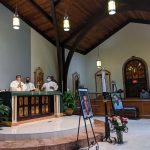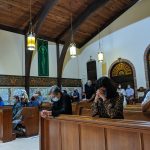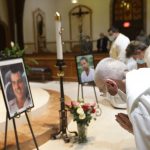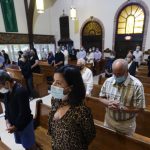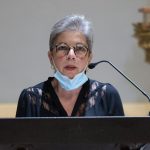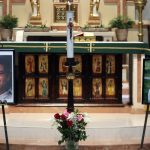This website uses cookies so that we can provide you with the best user experience possible. Cookie information is stored in your browser and performs functions such as recognising you when you return to our website and helping our team to understand which sections of the website you find most interesting and useful.
Tribute to Oswaldo Payá and Harold Cepero: Mass from Miami
Homenaje a Oswaldo Payá y Harold Cepero: Misa desde Miami
30 July, 2020
70 FIELES CATÓLICOS PIDEN PRONUNCIAMIENTO DE SUS OBISPOS SOBRE LA AYUDA HUMANITARIA RETENIDA
16 September, 2020In over a dozen cities around the world, their names resounded on Wednesday. In corners, houses and monuments, posters with their images were raised and their thoughts were read aloud. Masses were dedicated in churches from the United States, Europe and Latin America. Even inside the communist Island, despite repression, many demonstrated against what happened to them and two candles were lit along with their images.
Thus, not only were the lives of Cuban dissidents Oswaldo Payá and Harold Cepero remembered, but their deaths, which occurred on July 22, 2012, were also denounced, in what human rights organizations, lawyers, experts, witnesses and relatives of the victims consider that it was an attack executed by agents of the Cuban State.
“This fight continues” is the most important message that, according to journalist Julio Estorino, was sent again to the regime in Havana.
Payá was “a man consistent with his faith, with his civic life, with his life in the opposition. At all times he maintained his integrity, which is so necessary in struggles of this nature, as it was the one that he carried out” Estorino told Radio and Television Martí at the conclusion of mass at St. Raymond Church in Coral Gables.
For this scholar on the relations between the opposition to Castroism and the Church, the Christian Liberation Movement (MCL), created by Payá, is “based more than anything on his religious convictions, on Jesus Christ, and it is precisely out from that faith the sense of justice that he had. The same applies to Harold Cepero,” said the author of Biography of a Man of God: The Life of Monsignor Agustín Román, a key book to understand who was the Bishop Emeritus of Miami and founder of the Shrine Our Lady of Charity.
The path to freedom
Leading Cubans through the peaceful struggle “towards a path of freedom and democracy” was the essential purpose of Payá. «And at all times he testified to that. The last testimony was his death. As everything seems to indicate, he was victim of the executioners of the State Security. And you have to come to a conclusion: they don’t kill what doesn’t bother them; they don’t kill what they don’t think it can defeat them; they do not kill the one they consider insignificant. They kill those who by their example and their struggle could one day push them into where they belong. That is the reasoning of the Castro regime,” Estorino warned.
Unfortunately, Oswaldo Payá and Harold Cepero are not the first martyrs in this fight. There are now 60 years of martyrdom. But still just by killing, abusing, murdering, repressing, they have not been able to completely turn off the voice of the opposition. The message is that Oswaldo and Harold are seeds, they are not fallen trees, and that seed will continue to flourish until the day Cuba reaches freedom,” affirmed one of the most recognized voices of historical exile.
Source: RADIOTELEVISIONMARTI

